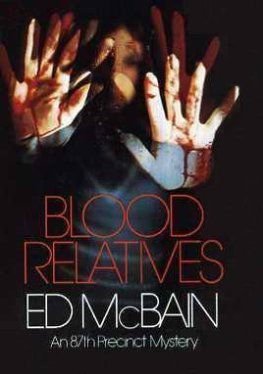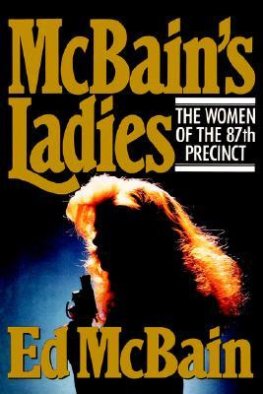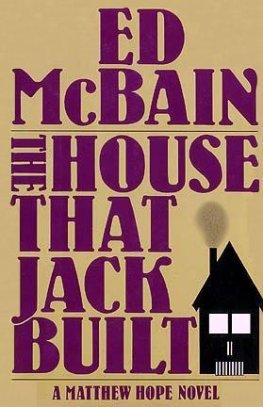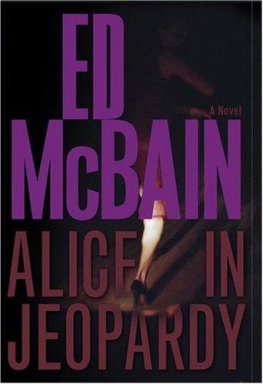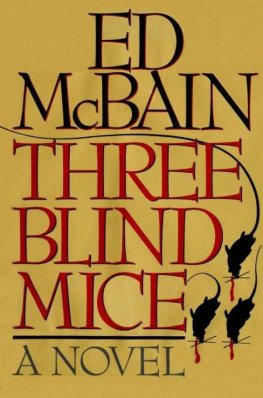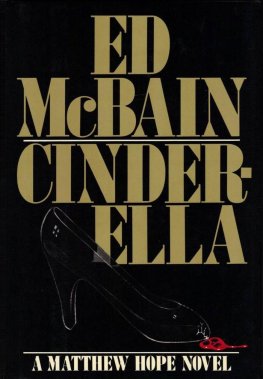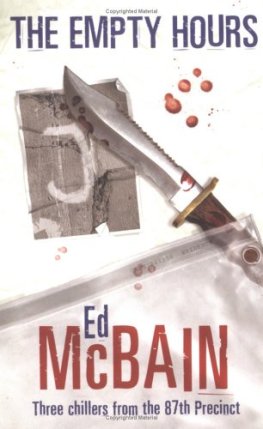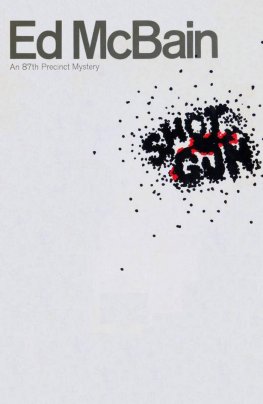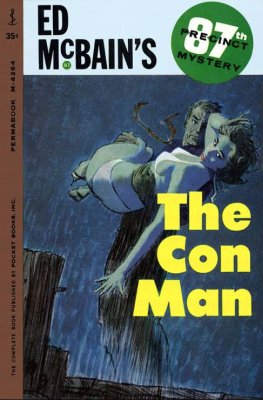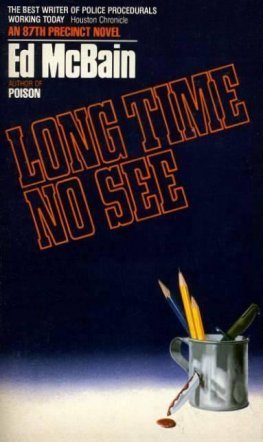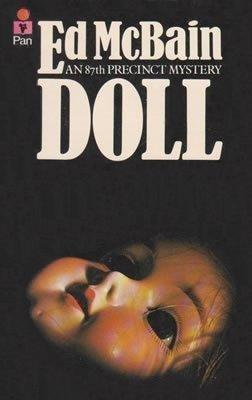Ed McBain - Blood Relatives
Here you can read online Ed McBain - Blood Relatives full text of the book (entire story) in english for free. Download pdf and epub, get meaning, cover and reviews about this ebook. City: New York, year: 1975, publisher: Random House, genre: Detective and thriller. Description of the work, (preface) as well as reviews are available. Best literature library LitArk.com created for fans of good reading and offers a wide selection of genres:
Romance novel
Science fiction
Adventure
Detective
Science
History
Home and family
Prose
Art
Politics
Computer
Non-fiction
Religion
Business
Children
Humor
Choose a favorite category and find really read worthwhile books. Enjoy immersion in the world of imagination, feel the emotions of the characters or learn something new for yourself, make an fascinating discovery.
- Book:Blood Relatives
- Author:
- Publisher:Random House
- Genre:
- Year:1975
- City:New York
- ISBN:978-0-394-48582-9
- Rating:4 / 5
- Favourites:Add to favourites
- Your mark:
- 80
- 1
- 2
- 3
- 4
- 5
Blood Relatives: summary, description and annotation
We offer to read an annotation, description, summary or preface (depends on what the author of the book "Blood Relatives" wrote himself). If you haven't found the necessary information about the book — write in the comments, we will try to find it.
Blood Relatives — read online for free the complete book (whole text) full work
Below is the text of the book, divided by pages. System saving the place of the last page read, allows you to conveniently read the book "Blood Relatives" online for free, without having to search again every time where you left off. Put a bookmark, and you can go to the page where you finished reading at any time.
Font size:
Interval:
Bookmark:
Ed McBain
Blood Relatives
This is for Jeff and Anita Ash
1
She came running through the rain shoeless, neon signs and traffic signals splintering in liquid reflection beneath her flying feet. She fled like misjoined Siamese twins, feet touching mirrored feet on the slick black asphalt, puddles of red and green, orange and blue splashing up tintlessly to stain her legs with the gutter filth of the city.
She was bleeding.
She was bleeding from a gash on her right cheek, and she was bleeding from cuts on the palms and fingers of both hands. The front of her dress had been ripped, and she tried to hold the torn sides of the V closed over her brassiere as she ran through the rain. It had been raining since 10:00. The rain was neither cruel nor driving now; it had changed to a gentle drizzle that sent mist drifting up from the pavement. In the distance, the green globes of the 87th Precinct shone through the rain and through the mist.
The girl slipped, her feet skidded out from under her. There was a bone-jarring wrench as her hip collided with the pavement. She expelled her breath in pain, and then sat quite still on the sidewalk, her head bent, the rain gently pattering around her. There was blood on her slip, and on her brassiere, smears of blood on her nylon pantyhose. Blood seeped from the open wound on her cheek, blood flamed in the horizontal slashes that crossed her palms and fingers. A traffic light turned to red, suffusing her with color so intense that for a moment only it seemed the steady ooze of blood had entirely engulfed the girl. The light clicked into the emptiness of the street. The girls face, her dress, the cones of her brassiere, the rain-spattered pantyhose, the seething cuts on her hands, the gash on her cheek, all turned green. She struggled to her feet and began running toward the station house.
Detective Bert Kling was at the muster desk, booking a young man who spoke only Spanish. He had just pointed to the Spanish-language version of the warning-of-rights poster. The young man looked up at the sign, nodded, and was beginning to read it silently when the girl burst into the muster room. There were two glass-paneled inner doors behind the wooden doors at the front of the station house. The girl hit those doors with the palms of both hands. Kling heard the thud of her hands hitting the glass panels, and turned immediately. Bloody palm prints. He would always remember seeing first the bloody prints, one on each of the glass-paneled doors. And then the doors swinging open and the girl spilling into the room. Arms wide, hands imploring, cuts on the fingers and palms, open wound on the cheek, wet black hair hanging limply about a pale mascara-streaked face, blue dress torn open over white blood-smeared bra, she lurched toward the muster desk, beseeching Kling to help, for Gods sake, help.
Patrolman Shanahan had wet feet.
The rain had stopped some ten minutes ago, but hed been sloshing around in it all day now (or at least since 3:45 this afternoon, when hed relieved Donleavy on post), and his feet were wet and he was developing a chill, and hed probably be home in bed for a week with the miseries. He was a large man, Shanahan, looking even bigger in the black raingear that billowed out from his massive shoulders like Batmans cape, or maybe Count Draculas. He carried a nightstick in his right hand, and a flashlight in the other, and he walked along the deserted pavements of this section of his beat, thankful that the rain had stopped, and thankful that it was already 11:30, which meant hed be relieved in fifteen minutes or so, but not too thankful for the wet feet or the squishy shoes.
He was surprised to see the hand.
The hand lay just outside the open doorway of an abandoned tenement. He could not see an arm attached to the hand, could not in fact see anything beyond the hand and the wrist, and he thought for a frightening moment that the hand had been severed from the rest of the body. But then he saw the faint outline of an arm, and beyond that, the shape of a body lying just inside and athwart the entrance to the building. He went up the wide flat steps of the front stoop to where the hand lay palm up on the top step, and he flashed his light onto the curled fingers and saw the cuts on the palm and the fingers and the wrist, and knew before he threw his light into the hallway that this was going to be a bad one.
He realized with a start that he was standing in blood, and recoiled from it in horror, as though it were capable of dissolving the soles of his shoes. As he backed away from the sticky puddle underfoot, the beam of his torch swung slightly higher, and he saw the body now and felt immediately sick to his stomach. He looked over his shoulder quickly, perhaps because death was so suddenly palpable in that narrow cubicle, perhaps because he was embarrassed by his reaction and wanted to make certain no one had seen it. The girl lay on her back in the blood. She was perhaps sixteen years old, and she had dark hair, and brown eyes that were open wide and staring up at the ceiling overhead. The ceiling was bloated with water that seemed ready to burst through the plaster and inundate the small entryway. The girl was wearing a pink dress that had been slashed to tatters. The knife had been relentless, cutting through fabric and flesh indiscriminately, gashes crossing and crisscrossing, overlapping in frenzy and fury, open angry trenches on her breasts and on her face Shanahan turned away and vomited into his hand when he realized the girls nose was hanging from her face by a single sliver of skin.
Then he went to the box on the corner and called the precinct.
Monoghan without Monroe was like bagels without lox Carella hardly recognized the man without his partner. In this city, the detective catching a homicide was responsible for the case from that moment on, but the Homicide Division nonetheless sent an obligatory team of detectives to the scene, presumably to lend their expertise to the investigation, or perhaps to guarantee a dignity appropriate to the seriousness of the crime. Monoghan and Monroe worked as a team out of Homicide, but tonight there was only Monoghan, and he sounded like a voice without an echo, looked like a body without a shadow. His partner was sick, he explained. The flu. More damn flu around this month. Wearing a black overcoat, white handkerchief in the breast pocket, black snap-brim fedora, black leather gloves, white silk muffler, black bowtie behind it, Monoghan seemed dressed for the Governors Ball, or at least the opera. He told Carella at once that he had been dragged away from an anniversary party, a golden anniversary no less, and hoped he could get back to it before long. He seemed to imply that Carella had personally caused the death of the young girl who lay in the hallway in her own blood.
How old you suppose she is? Monoghan asked. Her age, I mean, he added immediately, as though sorely missing Monroe and trying to supply in monologue the endlessly redundant dialogue that had become their trademark over the years.
She looks sixteen or seventeen, Carella said.
He was staring at the open wounds all over the girls body. He could never get used to it, would never get used to this senseless reduction of flesh to rubble. Ten minutes ago, a half-hour ago, the girl had been alive. She now lay in angular disarray in an alien hallway, her life juices spilled around her as carelessly as dirty water from a dish basin. He looked at her corpse and squinched his eyes in pain, and when Monoghan commented that the guy had probably raped her first, since her pantyhose were all ripped and bloody around the crotch, Carella said nothing.
In a little while the assistant medical examiner arrived. Like any other physician called out on a rainy night, he was grumpy. The fact that this was a Saturday, when people were supposed to be out having a good time instead of examining homicide victims, did little to enliven his spirits. No rest for the weary, he said, and put his black bag down beside the dead girl.
Font size:
Interval:
Bookmark:
Similar books «Blood Relatives»
Look at similar books to Blood Relatives. We have selected literature similar in name and meaning in the hope of providing readers with more options to find new, interesting, not yet read works.
Discussion, reviews of the book Blood Relatives and just readers' own opinions. Leave your comments, write what you think about the work, its meaning or the main characters. Specify what exactly you liked and what you didn't like, and why you think so.

